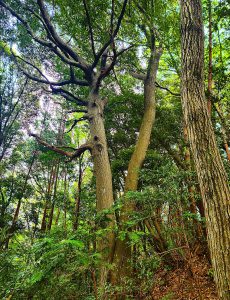「結び直す手」
- 2025.04.24
- 月刊芳美
「結び直す手」
山の上にある、小さな祠。
木々に囲まれた頂きで、春の始まりに人々は手を合わせる。
けれど、ある年。
その扉が、音もなく開いたまま、風に晒されていた。
「古いからな」と誰かが言い、
「仕方ない」と誰かが頷き、
それで終わった、はずだった。
けれど、気になってしまった。
不躾かもしれないけれど。
あの扉の「開きっぱなし」に、なぜか心が引っかかった。
知人を頼り、祠へ向かう。
道中、木々に結ばれたロープがある。
登る者の手助けのために。
しかしそれが、樹に食い込み始めている。
静かに、ゆっくりと、成長する樹皮を絞めつけながら。
共に登った老人が言う。
「木が可哀想だろ」
そう言って、ひとつひとつ、結び直してゆく。
彼は神も仏も信じない。
けれどその手は、誰よりも慎ましく、誰よりも信仰に近かった。
器物損壊になるから、とロープを切らず、
包丁を持参し、そっとほどいていくその姿は、
まるで、誰かの心の結び目をほどくようだった。
下山して、話を役員に伝えても、
「しばらく様子を見よう」と笑われた。
その笑みの奥には、恐れや疲れ、そして無言の伝統への従順が見えた。
誰かがやってきて、良かれと思って直すことすら、
ときに「余計なこと」として煙たがられる。
その夜、ふと思った。
自分が「正しいことをしている」と思っていたその心は、
どこかで“傷つける手”になってはいなかったか。
焼き切るのは簡単だ。
けれど、そうしなかった老人がいた。
力で断ち切るのではなく、手間をかけて、結び直す手があった。
そして私は思うのだ。
信仰とは、神に祈る姿ではなく、
誰も見ていない山の中で、木に食い込んだロープを結び直す手に宿るのかもしれないと。
“The Hand That Re-Ties”
At the top of a modest hill stood a humble shrine,
nestled among the trees, visited once a year
when the new spring begins.
This year, the door to the shrine remained ajar.
No wind had opened it—
it simply hung there, quietly, as if waiting.
“It’s old,” someone said.
“It happens,” another shrugged.
And just like that, it was left behind.
But something about it lingered in me.
The open door.
The silence behind it.
So I returned, with a friend—
an old man who believes in neither gods nor spirits,
but knows how things work and where they break.
As we climbed the slope,
we passed ropes tied between trees—
a modest help for aging feet or unsteady steps.
He stopped.
Carefully, he loosened the knots and retied them.
When I asked why,
he said, “The trees grow. The rope bites in. It hurts them.”
It wasn’t faith I saw in that moment.
It was something quieter.
Something deeper.
At the shrine, we found not just the front door ajar,
but the inner chamber—
home to a weathered stone figure—was misaligned too.
We decided to wait before fixing it,
to tell those in charge,
to respect their rhythm.
Later, I quietly offered help to one of the committee members.
“I can cover the labor,
if someone covers the materials,” I said.
But the chairman, a bit drunk, simply replied,
“Let’s wait and see.”
And in that moment,
I remembered what the old man often said:
“They’re not poor in money. They’re poor in spirit.”
Still, it wasn’t malice I saw—
but fear, perhaps.
Of change. Of responsibility. Of being questioned.
Maybe even fear of divine punishment
for disrupting what has been left untouched for so long.
I’ve offered help before—at another shrine,
only to be told,
“The moss is part of the beauty.”
Was it reverence? Or just resistance?
I realized then:
Good and evil aren’t always grand things.
Sometimes they sprout quietly
from the friction of different values—
of pride, memory, age, and timing.
And I remembered how the old man
refused to cut the ropes with fire.
“Could be vandalism,” he said.
So he brought a knife—quiet, respectful—and worked by hand.
He didn’t pray.
But he re-tied the knots.
And maybe that’s what faith looks like—
Not in temples or chants,
but in the hand that untangles a tree’s pain
and ties it anew.
